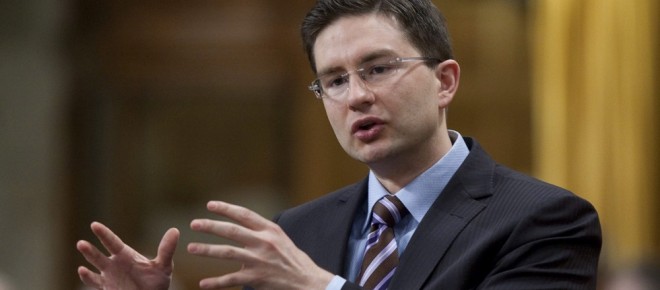The Commons: Drawing a line at “stupid”
The House is easily offended. Sometimes.
Conservative MP Pierre Poilievre rises during Question Period in the House of Commons on Parliament Hill in Ottawa, Monday March 7, 2011. THE CANADIAN PRESS/Adrian Wyld
Share
 The Scene. After some hurling of invective over other issues, the House turned to the matter of Dean Del Mastro’s apparent willingness to upend the constitutional order by which this country has functioned for more than 144 years.
The Scene. After some hurling of invective over other issues, the House turned to the matter of Dean Del Mastro’s apparent willingness to upend the constitutional order by which this country has functioned for more than 144 years.
“Mr. Speaker, in the past month the Parliamentary Secretary to the Prime Minister has been called out by the Canadian judiciary, the Ethics Commissioner, the bar association, but now the senior law clerk of the House of Commons is warning that his behaviour at committee is interfering in the independence of the courts that is both unconstitutional and ‘unlawful,’ ” the NDP’s Charlie Angus reported. “Either the government respects the constitutional limits of Parliament or it does not.”
In his seat across the way, Mr. Del Mastro slapped his own hand and laughed.
“I have a simple question,” Mr. Angus declared. “Will the government rein in this rogue member, yes or no?”
It was here Heritage Minister James Moore’s responsibility to clarify that it was, in fact, Mr. Del Mastro’s duty to do as he has been doing.
“Mr. Speaker, our government was elected and the member for Peterborough was elected to look out for taxpayers and that is what he has been doing,” Mr. Moore ventured. “He deserves the applause of the House, on all sides, for standing up for taxpayers. That is what he has done.”
So you should understand that Dean Del Mastro is apparently the only thing standing between us and the tyranny that is the separation of powers and other such principles of Western democracy. Or at least the only thing standing between us and the tyranny of the CBC, which, Mr. Moore was quick to explain, this was all about anyway.
Mr. Angus and Mr. Moore reenacted their morality play en français and then the House moved on to the small matter of the governing party having violated election law in the process of winning office.
“Mr. Speaker, last week the Conservative party of Canada pled guilty to exceeding campaign spending limits, failing to report election expenses, and violating the Canada Elections Act,” the NDP’s Jack Harris reported. “Despite being found guilty, the Conservatives are calling it a victory. Plea bargaining and paying the maximum possible fines so that Conservative party operatives do not get thrown into prison is not vindication. It is contemptible.”
Then the sort of question that might’ve flummoxed a more logic-based forum. “When,” Mr. Harris asked, “will the government stand up for election spending rules and get tough on the rule breakers in the Conservative party?”
For whatever reason, this was deemed Pierre Poilievre’s responsibility and so the slick parliamentary secretary stood to read aloud from a document which indicated that, on some matter Mr. Poilievre left unspecified, Elections Canada had at some point found the NDP to be somehow in breach.
It was unclear if Mr. Poilievre did this to pronounce shame on the opposition or congratulate them on their victory. Either way, Scott Simms, a Liberal, was up a moment later to retell the story.
“Mr. Speaker, just to revisit the issue, last week the Conservatives finally pled guilty to breaking the Canada Elections Act with their in-and-out scam,” he recounted for those with short-term memory problems. “They have been hit with the highest fines possible, breaking two counts of the law, yet what we get is a stupid response from the parliamentary secretary speaking of—”
Where they had been mostly unmoved by allegations of unconstitutional and unlawful excess, here the Conservatives howled at Mr. Simms’ use of one of the lesser s-words and were duly pleased when the Speaker admonished the Liberal backbencher for his adjective.
The Stats. Trade and the economy, six questions each. The RCMP, five questions. Energy and ethics, four questions each. The CBC, infrastructure, air safety, veterans and the judiciary, two questions each. Immigration, bicycling safety, tourism and crime, one question each.
Peter MacKay, six answers. Joe Oliver, Vic Toews, Gerald Keddy, Steven Fletcher and Pierre Poilievre, four answers each. Rob Nicholson, three answers. Ted Menzies, James Moore and Steven Blaney, two answers each. Tony Clement, Jason Kenney, Christian Paradis and Maxime Bernier, one answer each.